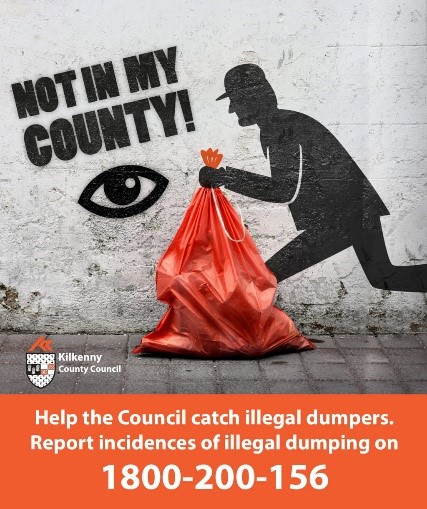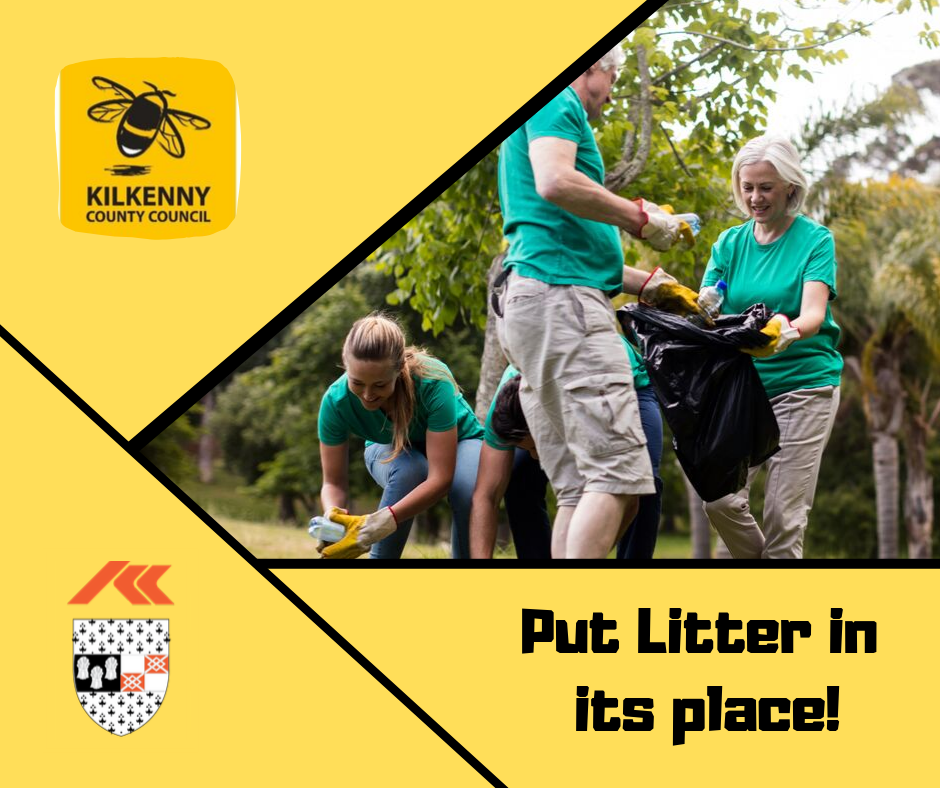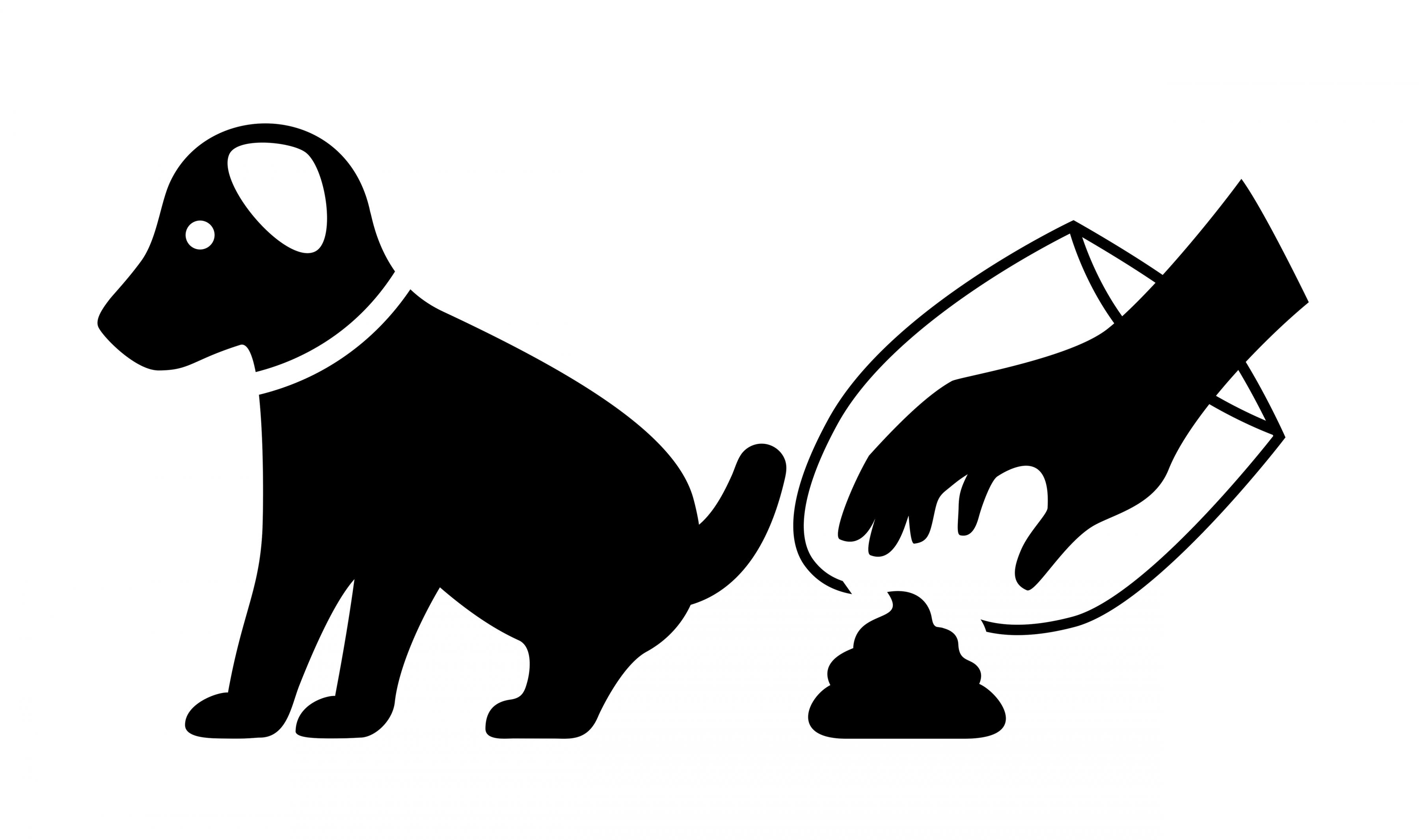6.0 Challenges and Future Solutions
Litter is a persistent problem in Ireland and one of the biggest challenges facing Kilkenny County Council is how to motivate the public to act against litter. This challenge is considered best addressed by a partnership approach involving all key stakeholders (e.g. residential, commercial and community) to raise awareness of litter and its effects. In tandem, the Council must review and enhance, where necessary, its own role in litter prevention and control.
Kilkenny County Council has identified the following as being challenging issues as they were not fully resolved in the last plan and more resources or a different approach may be required to eliminate litter or at the very least, decrease its impact on the environment.
- Illegal dumping
- Scattered litter caused by passing motorists and pedestrians
- Keeping Bring Banks Litter Free
- Dog Fouling
- Demand and Supply of Litter Bins
- Unauthorised Temporary Signage
What do you consider the difficulties regarding litter? We would like to hear your opinions, make your observation or offer an idea or solution by submitting your views during the public consultation phase of the draft litter Management Plan via consult.kilkenny.ie or via a letter sent to LMP Consultation Phase, C/O Environment Section, County Hall, John Str., Kilkenny City before the 5th of April 2021.
6.1 Illegal dumping
The enforcement team has been pursuing illegal dumpers and is working efficiently with strengthened capability due to availability of advanced technology funded from the National Anti-Dumping Initiative Fund (2017-2020).
The commencement of the Waste Management Bye Laws in 2019 gave the enforcement team authority to request proof of household waste management arrangements from residents. In 2020 with Covid restrictions limiting door to door interactions, an online survey was developed and this activity will continue into 2021. Failure to comply with the request for waste management details can lead to a fine. These checks ensure households are managing their waste appropriately and will assist in clamping down on unauthorised waste collectors.
CCTV capacity at bottle banks has increased and this will continue as it proves to be an excellent deterrent to keep these facilities litter free. This network will be maintained and increased if funding is made available to accommodate additional bring centre sites.

The bulky waste collection days in 2019 and 2020 will continue (subject to funding) should they prove to be assisting in the abatement of illegal dumping. Waste management facilities like Dunmore Recycling Centre will be promoted as they offer a cost-effective method to managing waste.
The Southern WERLA office with responsibility for coordinating waste enforcement actions within the region produced an anti-dumping campaign which will be rolled out by Kilkenny County Council in 2021.
Visible enforcement must be promoted to deter fly tipping. This will continue in collaboration with media news outlets as the Council cannot “Name and Shame” litter louts as it is in breach of the principles of data protection as set down in the Data Protection Act, 1988.
All these actions together should target those who dump rubbish irresponsibly and track the key performance indicators (Appendix A) throughout the plan period to determine if these actions are effective against illegal dumping.
6.2 Scattered Litter
Scattered litter is visually obtrusive, potentially harmful to wildlife and is often dangerous to remove due to its occurrence on the sides of busy roads.
Annual awareness campaigns are run by the Council to remind the public the issue litter poses for example, illegally dumped bulky goods can block drains leading to surface flooding on rural roads, plastic litter can pose a threat to wildlife and with the Covid pandemic, the littering of personal protection equipment (PPE) like disposable masks and gloves is a public health concern.
The long-term goal of the green school’s programme which the Council co-ordinates locally with An Taisce, is to ensure that every pupil in participating schools has an appreciation of the environment and will be its custodian for life.
In the short term, enforcement must play a role to act as deterrent to the small and irresponsible element of society that disregards the litter laws. It is the Councils ambition to increase enforcement on the ground by the provision of additional staff, it is anticipated that these roles will become operational within the plan period.
In 2020, the government published its National Waste Policy 2020-2025 “A Waste Action Plan for a Circular Economy”. If a number of objectives within this plan become operational, it will greatly benefit the issue of strewn litter as the plan includes schemes such as a deposit/return scheme for plastic drink bottles and drink cans. These are two of the most common items found littering our roadside and if they become treated as a resource, an item of value, it is more likely that they’ll be kept and redeemed for cash rather than being discarded. A latte levy is proposed for disposable coffee cups, these too are an item often discarded and a tax on these items should encourage the public to revert to re-usable cups.
The Councils of the South East will continue to collaborate and highlight the issue of roadside littering through regional campaigns similar to those which took place in 2018 and 2020.

While this Plan outlines the Council’s street cleaning responsibilities, it will continue to work with the community and different interest groups to assist them to keep their areas litter free. This will be achieved by providing litter picking supplies, arrangement of the collection of litter collected via organised litter picks and it is the Councils intention within this plan period to set up a whole county clean up day, a day where all sectors of the community complete a clean up like those organised elsewhere like the Limericks TLC campaign. This campaign has seen 21,000 volunteers participating in one day to complete local litter picks on the one day. In the interim, Kilkenny County Council will continue to support the National Spring Clean.
6.3 Keeping Bring Banks Litter Free
There are 46 bring bank centres in the county. While there is a service contract in place to ensure they do not reach capacity, there are occasions when this is difficult. Christmas and Easter are problematic annually and in 2020 with Covid restrictions the bring centres experienced a surge in usage in Kilkenny which was reflective across the country. At these peak times, Kilkenny County Council works with the service provider to resolve issues as soon as practicable.
A cleaning contract is in place to ensure the bottle banks are inspected regularly with materials cleared away and receptacles power washed regularly to ensure they remain clean and presentable.
The CCTV capability at bring centres has improved with the assistance of Anti-Dumping Funding, this enforcement measure does and continues to persuade people keep the banks litter free otherwise, a strict policy of no leniency is in place for litter offenders.
It is an objective of the Council to continue to keep the bring centre capacity at an acceptable level and to keep them maintained by a cleaning contractor. The Council continues to seek new sites to increase capacity across the county.
6.4 Dog Fouling
Dog fouling poses many challenges. Dogs let out unaccompanied is difficult to resolve unless the dog owner can be identified and the owner is subsequently visited by the dog warden as letting a dog out unaccompanied is illegal under the Control of Dogs Act.
Dog walkers are obliged to clean up after their dog and the Council previously promoted the motto “Any Bag, Any Bin” and in recent times bag dispensers have been installed in Kilkenny City and in urban areas around the county. These bag dispensers work well when there are public bins in the vicinity however when litter bins are absent, bags are often abandoned after the dog owner has placed waste in the bag. This is an ongoing problem which needs to be addressed.
The lack of bag dispensers in neighbourhoods often generate requests for their installation, however installed dispensers must be kept stocked with bags and this too incurs a significant annual cost and a time resource. To date, there has been no clear strategy on their placement in the city whereas in the town and villages in the wider county, an agreement is in place that when feasible, the Council will purchase and install the bag dispenser unit on agreement that the local Tidy Towns group keeps it stocked with bags and incur the cost which can then be recouped via the Councils anti-litter grant.

Image; Cleaning Up After your Dog Imagery
Under the Litter Pollution Act, dog owners face a litter fine of €150 if they fail to pick up after their dog, therefore before leaving their house, they should be prepared by carrying a bag with them on all dog walks and should not be depending solely on a public bag dispenser, these are only intended for dog walkers who forget to bring a bag with them on their walk.
A pilot project will be rolled out in 2021 to set up dog friendly walking routes, these will be promoted as suggested walking routes for dog walkers that have a litter bin. But the message will be clear, if there is no bin when you need one, you must dispose of it at home, dumping bags of dog faeces is not acceptable. If successful, additional routes will be rolled out. The Council will be running a new dog fouling campaign, commencing in March 2021, it will promote a simple message, Bag It and Bin It. Dog walkers must be prepared going for a walk and have bags with them and only use Council bag dispensers if they forget theirs. The Council cannot be the sole supplier of bags for dog walkers when they are readily available in shops at very low prices. In Kilkenny City, the 23 bag dispensers cost approximately €10,000 annually to keep them stocked with bags.
6.5 Demand and Supply of Litter Bins
The Council receives numerous requests to install public litter bins. While Kilkenny City centre is well serviced, they are infrequent in the city suburbs. In county towns and villages, their distribution can also be infrequent.
Litter bins pose a challenge for local communities and the Council. The installation of a litter bin is frequently not the issue but its life time of servicing. Litter bins must be serviced regularly to ensure they do not become a burden on the local environment, therefore time and a financial resource are required for the lifetime of the litter bin. The other issue based on the Councils experience, is that litter bins often become a target for illegal dumping, that is, householders start filling the bin with household waste which is illegal under the Litter Pollution Act. This impacts the bins capacity as the bin fills quicker, requiring a more frequent service, disposal costs associated with the bin increases and the household waste, unlike street litter, often can attract rodents as it becomes a source for food, which then becomes a public health issue. These are the reasons why litter bins are not usually located in residential areas. However, a balance must be struck and this is something which requires collaboration between the Council and local communities. In Appendix B, it outlines the guidance of the placement of a litter bins and dog bag dispensers when the Council receives a request.
Not all street litter bins are serviced by the Council, many in the small villages are under the stewardship of the local community. They service and dispose of the waste independently of the Council and are supported financially by means of the anti-litter grant.
As town and village renewal schemes are implemented, litter bins should be included in the design providing that the relative Council Area Office has capacity to service it. Requests for a placement of a litter bin will be directed to the relevant area office who will make the decision if the litter bin servicing can be facilitated by Council personnel.
6.6 Unauthorised Temporary Signage
Advertising is a vital component of business activity and a means of providing information to the general public. However, advertising signs, separately, or more particularly, in groups, can cause injury to amenities and can detract from the appearance of an area. They can also be a distraction to road users as well as being a hindrance to pedestrians, particularly the less abled and those with buggies.
The Temporary Signage Policy is being reviewed to determine if the procedure can be streamlined for the applicant, the Municipal District Office that processes the temporary signage applications and the environmental enforcement team which enforces the policy through the Litter Pollution Act.
The aim of this policy is to support good, creative and necessary temporary signage in appropriate places for appropriate events. It will ensure that the overall presentation of the City and County and the image which it portrays to residents, visitors and potential investors is not negatively affected by inappropriate and unauthorised signage. The aim is not to be anti-business or anti-community but rather to support economic activity, quality of standards and consistency in decision-making.
Once reviewed, it will be presented at each Municipal District meeting to ensure the Elected Members can input into the draft Policy. The revised draft policy will undergo a public consultation phase prior to being presented to SPC 4 and then will be brought forward to Council with a report from the Chief Executive for formal adoption.